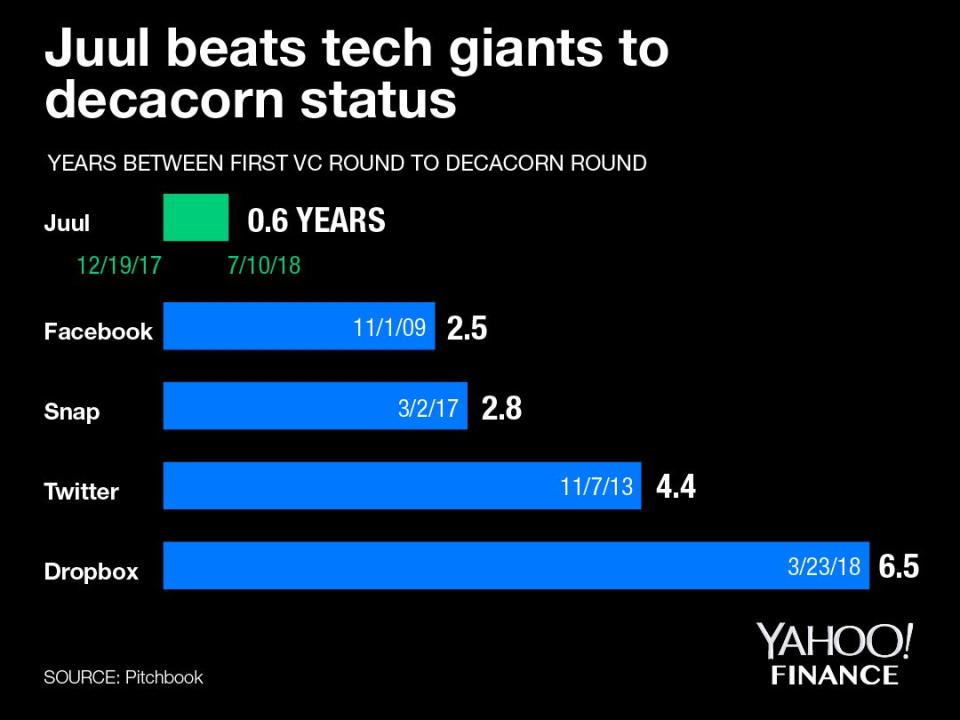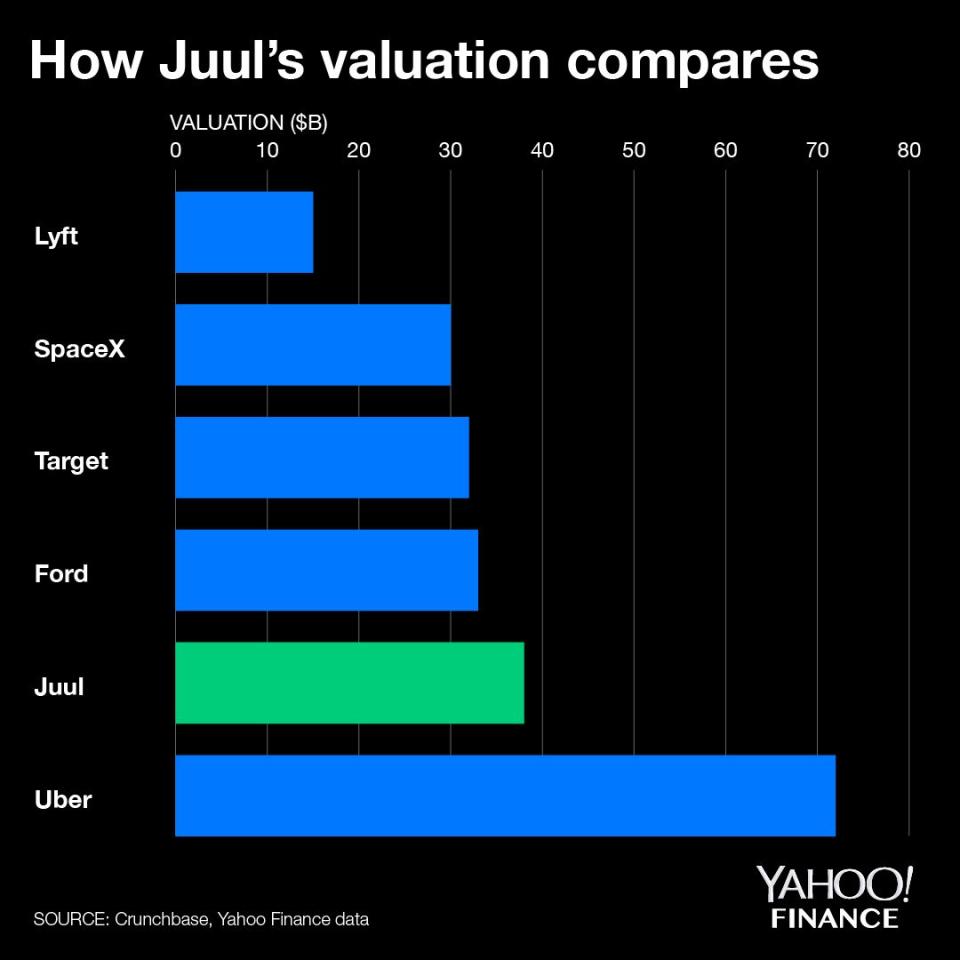Juul is now worth more than SpaceX at a $38B valuation
The country’s largest e-cigarette maker Juul Labs continued its astronomical rise from startup to vaping behemoth by finalizing the terms of its latest deal with Big Tobacco firm Altria Group (MO).
The $12.8 billion deal, which Altria announced Thursday morning, is slated to give the maker of Marlboro a 35% stake in Juul, valuing the less than two-year-old vaping company at $38 billion.
The new valuation is more than double the $16 billion valuation Juul last earned when it raised $650 million from investment fund Tiger Global just five months ago this summer. At that point, Juul became the fastest startup ever to reach a valuation of more than $10 billion dollars — beating the pace set by tech giants Facebook and Snap by four times.

“This is a unique and compelling opportunity to invest in an extraordinary company, the fastest growing in the U.S. e-vapor category,” Altria CEO Howard Willard said in a statement announcing the deal.
But while that growth is attractive for a tobacco company that has seen sales of its Marlboro cigarettes drop more than 3% in the most recent 52-week period compared to Juul’s 941% explosion in the same timeframe, the question inevitably on investors’ lips will become “Did Altria overpay?”
By voting to invest in Juul at a valuation of $38 billion, Altria’s board made the calculation that Juul is worth twice as much as Lyft, or about $8 billion more than Airbnb and Elon Musk’s SpaceX. At $38 billion, Juul even surpasses the size of some well-known publicly traded companies like Target (TGT) and Ford (F). Not bad for a company that was spun off from parent company Pax Labs less than two years ago.

Altria funded the deal to acquire its minority stake in Juul with a $14.6 billion one-year term loan through JPMorgan Chase, a decision that will carry its interest costs into 2019 and beyond. Addressing that concern with investors on a call Thursday, Willard said the company would mostly offset those expenses with cost savings of around $600 million in 2019.
“We remain committed to maintaining our investment grade credit rating,” he said.
Of course, Juul’s rise to prominence has also come shrouded in controversy as the startup has increasingly faced scrutiny from the U.S. Food and Drug Administration for playing a role in what the agency labels as a teen vaping “epidemic.” Studies from the Centers for Disease Control and other medical professionals have pointed to a near doubling in the percentage of high schoolers who vape in just the past year. Anti-tobacco advocates argue that underage teens purchasing Juul’s products have played a non-trivial role in the e-cigarette maker seeing it’s sales skyrocket to nearly $2 billion a year.
Nonetheless, Altria decided the possible rewards outweigh the regulatory risks and refused to stand by and watch Juul dominate the e-cigarette category as the tobacco firm awaits FDA approval of its own cigarette alternative IQOS. On the investor call Willard admitted he was growing “a little impatient” with the approval process.
Altria deal better for Juul
That might be part of the reason the deal seemingly leans in Juul’s favor, at least on paper. Despite gaining a third of Juul’s board seats, Altria is prohibited from increasing its 35% stake and cannot sell its shares for six years after the deal closes pending regulatory approval. The company also agreed to give Juul logistics and distribution support and shelf space at its 230,000 retail locations. It will also allow Juul to reach Altria’s current smoking customers: Juul can place inserts in cigarette packaging and have access to Altria’s database of customers.
“We are somewhat concerned about the terms of the deal on its face given it doesn’t appear [Altria] MO has as much control as we would have thought,” Wells Fargo tobacco analyst Bonnie Herzog wrote in a report following the deal’s announcement. Despite that, Herzog reiterated her Outperform rating on the belief that the deal’s “value will become more and more apparent.”
For Juul, the deal’s value is more readily apparent. As part of the $12.8 billion Altria agreed to pay in the deal, about $2 billion will go towards a dividend bonus payment to be divided among Juul employees, according to Bloomberg. While it will likely be paid out depending on role and tenure with the company, at a size of roughly 1,500 employees that would break down to an average of $1.3 million per employee.
That might just be enough to quell the unease among some Juul employees who reportedly balked at the idea of taking Big Tobacco’s money.
Zack Guzman is a senior writer and on-air reporter covering entrepreneurship, startups, and breaking news at Yahoo Finance. Follow him on Twitter @zGuz.
Read more:
Juul surpasses Facebook as fastest startup to reach decacorn status
How Juul became the FDA’s latest target
Joe Camel illustrator: E-cig maker Juul’s marketing ‘seems more egregious’
